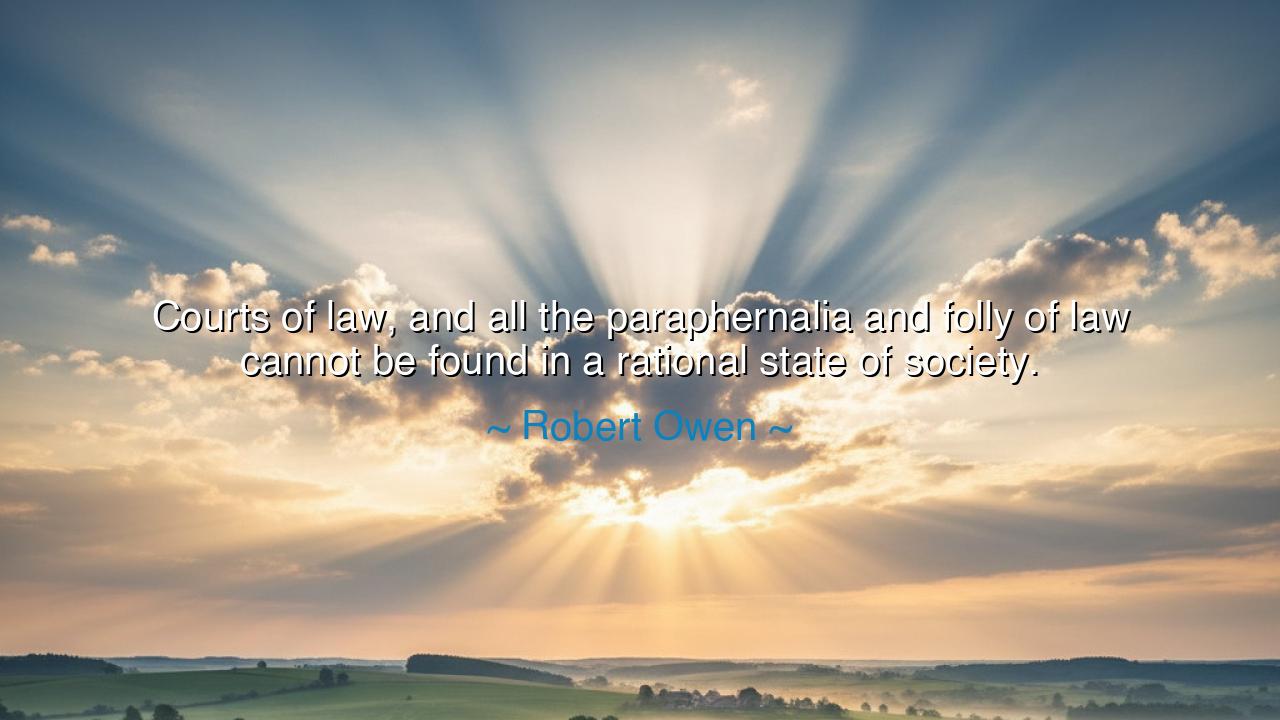
Courts of law, and all the paraphernalia and folly of law cannot
Courts of law, and all the paraphernalia and folly of law cannot be found in a rational state of society.






The words of Robert Owen, “Courts of law, and all the paraphernalia and folly of law cannot be found in a rational state of society,” burn with the fire of vision. Here speaks not a lawyer or politician, but a dreamer and builder of utopias, one of the great fathers of modern socialism and cooperative thought. Owen, who lived in the nineteenth century amid the harsh realities of industrial England, looked upon the endless disputes, the prisons, the corruption of courts, and declared that such machinery was a sign not of reason, but of failure. In his dream of a rational society, people would not require the scaffolding of courts, for justice would not be enforced from above but would flow naturally from the harmony of enlightened beings.
The origin of this saying lies in Owen’s own experiments. As a factory owner in New Lanark, Scotland, he transformed his mills into places not of oppression but of reform: children were educated instead of exploited, workers were given better conditions, and cooperation was emphasized over competition. He believed that if human beings were nurtured in a rational environment, with their needs met and their spirits respected, crime and conflict would fade away. Thus, the elaborate rituals of the law, which often served the wealthy and crushed the poor, would no longer be necessary. For in a just society, justice is not imposed—it is lived.
History bears witness to both the need for Owen’s dream and the weight of his warning. Consider the countless ages in which courts of law became instruments of tyranny rather than justice. In ancient Rome, the law was said to protect all citizens, yet too often it shielded the powerful while enslaving the weak. Trials were spectacles where wealth and influence could buy verdicts. Owen, surveying the courts of his own age, saw little difference. To him, the paraphernalia of wigs, robes, and endless procedures were not signs of civilization, but symptoms of a society that had lost its rational soul.
Yet there are glimpses, too, of societies that reached closer to his vision. Among the Iroquois Confederacy, disputes were often settled through councils and consensus rather than adversarial courts. Harmony was sought through dialogue, with justice grounded in community rather than punishment. Likewise, small cooperative communities that Owen himself inspired sought to create conditions where conflict dissolved through shared responsibility. These examples remind us that the folly of law is not eternal—it is a product of systems that breed inequality and mistrust.
The meaning of Owen’s words, then, is not that all law is evil, but that law is a crutch for societies that have failed to live in reason. In a rational society, people would not need endless courts to settle disputes, because education, compassion, and fairness would prevent most disputes from arising in the first place. The machinery of law, with its prisons and punishments, arises when communities are broken, when greed triumphs over cooperation, and when selfishness replaces solidarity. The ultimate vision is one of harmony where justice is so deeply rooted in the character of the people that courts are no longer needed.
The lesson for us is clear: do not simply rely on external law to govern your life, but cultivate the inner law of reason, compassion, and justice. If you live only by fear of punishment, you are not free. True freedom comes when you live by principle, when you treat others with fairness not because the law compels you, but because your heart knows it is right. A rational society begins not in parliament or courtroom, but in the daily conduct of individuals who practice empathy, honesty, and care.
Practical actions follow naturally. Nurture the conditions of justice in your family, your community, and your work. Resolve conflicts through dialogue rather than domination. Support systems of education that cultivate moral character, not only technical skill. Live cooperatively, remembering that the health of society is measured not by how many courts it builds, but by how little it needs them. And above all, let your own conduct be such that you strengthen the bonds of trust, rather than add to the burdens of law.
Thus let Robert Owen’s words endure as both a critique and a prophecy. Courts of law and their trappings may be necessary in our flawed world, but they are signs of imperfection, not of perfection. The dream of a rational society calls us higher, to a time when justice is not demanded but embodied, when freedom is not granted by rulers but lived by all. Until that day, let each person strive to carry within themselves the law of compassion, so that step by step, generation by generation, we may draw nearer to that harmonious state where the folly of law will finally be no more.






AAdministratorAdministrator
Welcome, honored guests. Please leave a comment, we will respond soon